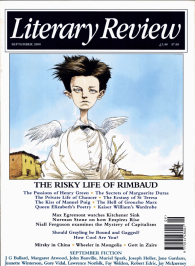Kate Kellaway
Was it an Accident?
The Blind Assassin
By Margaret Atwood
Bloomsbury 520pp £16. 99
Margaret Atwood is one of the most brilliant and unpredictable novelists alive. She is always putting her past behind her: her novels share no family likeness. It is strange to recall her early books, such as Surfacing and The Edible Woman. They were slender and graceful – and very much a young writer’s work. But Atwood has gone on to greater things. Now even her style is impossible to second-guess: The Robber Bride (1993) was fast and loose; Alias Grace (1997) – short-listed for the Booker Prize – was more literary, decorous, researched. The two had only one thing in common: they were compulsive reads.
The Blind Assassin is different yet again. There is nothing easy about it. It is abrasive, capacious, demanding. It is Victorian in size and ambition – and takes the reader over gradually but completely. It works by extraordinary sleight of hand. It is a riddling book, which seems to be

Sign Up to our newsletter
Receive free articles, highlights from the archive, news, details of prizes, and much more.@Lit_Review
Follow Literary Review on Twitter
Twitter Feed
The son of a notorious con man, John le Carré turned deception into an art form. Does his archive unmask the author or merely prove how well he learned to disappear?
John Phipps explores.
John Phipps - Approach & Seduction
John Phipps: Approach & Seduction - John le Carré: Tradecraft; Tradecraft: Writers on John le Carré by Federico Varese (ed)
literaryreview.co.uk
Few writers have been so eagerly mythologised as Katherine Mansfield. The short, brilliant life, the doomed love affairs, the sickly genius have together blurred the woman behind the work.
Sophie Oliver looks to Mansfield's stories for answers.
Sophie Oliver - Restless Soul
Sophie Oliver: Restless Soul - Katherine Mansfield: A Hidden Life by Gerri Kimber
literaryreview.co.uk
Literary Review is seeking an editorial intern.